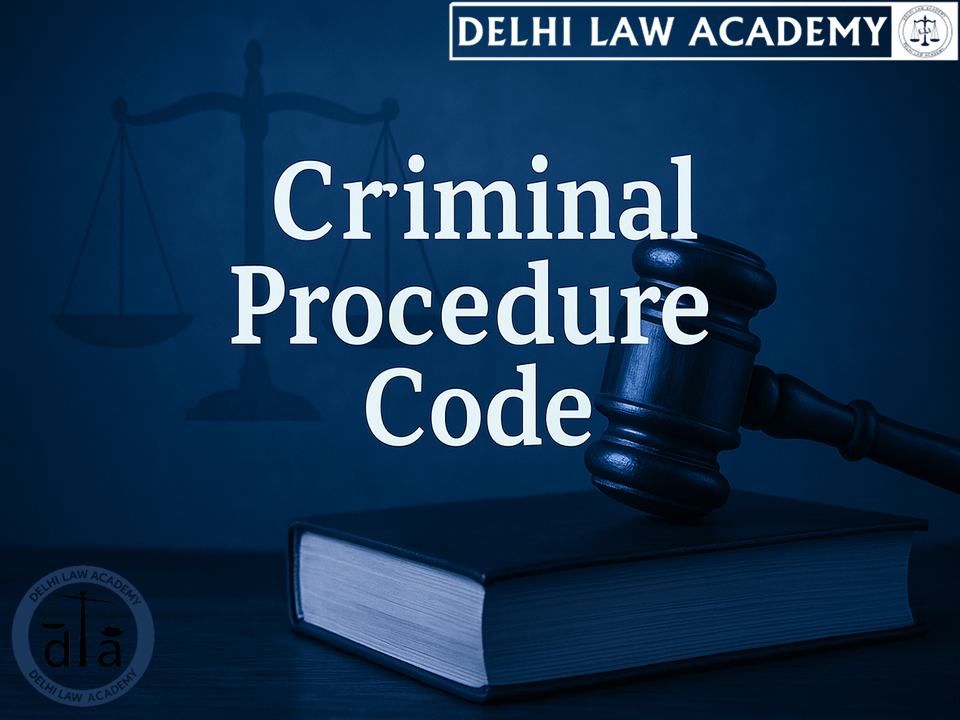
⚖️ Criminal Procedure Code: Anticipatory Bail (Section 438)
🎓 Preparation for RJS, DJS, PCS(J) and Other Judicial Service Exams
The Criminal Procedure Code forms the bedrock of every Judicial Service exam in India. Its thorough knowledge is a must for all aspirants of RJS, DJS, PCS(J), and other Judicial Service exams. To help such aspirants, DELHI LAW ACADEMY JAIPUR has launched a series of study material modules on all important aspects of this vital part of their syllabus.
📘 Section 438(1): Bail to Person Apprehending Arrest
- Where any person has reason to believe that he may be arrested on accusation of having committed a non-bailable offence, he may apply to the High Court or Court of Session for a direction that in the event of such arrest he shall be released on bail.
- After taking into consideration the nature and gravity of the accusation, antecedents of the applicant (including whether he has previously undergone imprisonment for a cognizable offence), the possibility of the applicant fleeing from justice, and whether the accusation was made to injure or humiliate the applicant, the High Court or Court of Session may either reject the application or issue an interim order for grant of anticipatory bail.
🚫 No Interim Order, No Stay
- Where a High Court or Court of Session has not passed any interim order or has rejected the application for grant of anticipatory bail, it shall be open to a police officer to arrest the applicant without warrant on the basis of the accusation.
📩 Section 438(1A): Notice to Public Prosecutor
- Where a Court grants an interim order, it shall forthwith cause a notice of not less than seven days together with a copy of such order to be served on the Public Prosecutor and the Superintendent of Police, giving the Public Prosecutor a reasonable opportunity of being heard when the application shall be finally heard.
👤 Section 438(1B): Presence of Applicant
- Presence of the applicant seeking anticipatory bail shall be obligatory at the time of final hearing and passing of final order if, on an application made by the Public Prosecutor, the Court considers such presence necessary in the interest of justice.
- Note: Inserted by CrPC Amendment Act, 2005.
🛡️ Section 438(2): Conditions for Anticipatory Bail
- The Court may impose the following conditions:
- The person shall make himself available for interrogation by a police officer as and when required.
- The person shall not make any inducement, threat, or promise to any person acquainted with facts of the case so as to dissuade him from disclosing such facts to a court or police officer.
- The person shall not leave India without previous permission of the Court.
- Other conditions as may be imposed under Section 437(3).
📜 Section 438(3)
- If such person is thereafter arrested by a police officer without warrant on such accusation and is prepared to give bail, he shall be released on bail.
- If a Magistrate taking cognizance of such offence decides that a warrant should be issued, he shall issue a bailable warrant in conformity with the direction of Court.
🚷 Section 438(4): Exceptions to Anticipatory Bail
- This section shall not apply to any case involving the arrest of any person on accusation of having committed an offence under Sections 376(3), 376AB, 376DA, or 376DB of IPC.
This provision was inserted by the Criminal Law Amendment Act, 2018 (effective from 21st April 2018).
As a result of this new provision, protection of anticipatory bail is not available to persons accused of having committed rape or gang rape of women under sixteen years or under twelve years of age.
Protection of anticipatory bail is also not available to persons accused under the SCs and STs (Prevention of Atrocities) Act, 1989.
Section 18 of the Act provides: Nothing in Section 438 of the Criminal Procedure Code shall apply to a case involving arrest of any person on an accusation of having committed an offence under this Act.
🔹 Delhi Law Academy Jaipur — Comprehensive CrPC Notes for RJS | DJS | PCS(J)
💬 FAQs — Anticipatory Bail under Section 438 CrPC
- The nature and gravity of accusation.
- Applicant’s antecedents or previous convictions.
- Possibility of fleeing from justice.
- Whether the accusation was made to humiliate or injure the applicant.
These ensure anticipatory bail is not misused.
📘 Free Study Material for Judiciary Aspirants!
Download our FREE study material prepared by Delhi Law Academy’s expert faculty.
Contact us
📍 Delhi Law Academy – Jaipur Branch
6C, Tower 2, Coaching Hub, Pratap Nagar, Jaipur – 302033
📞 Phone:
+91 9911916552
+91 8447285606
✉️ Email:
contactus@delhilawacademy.com

